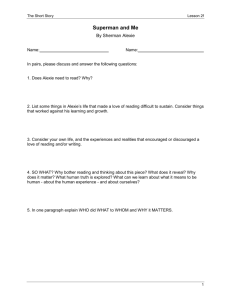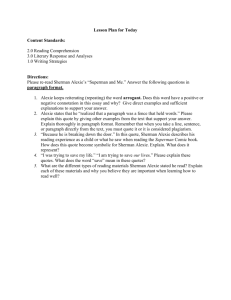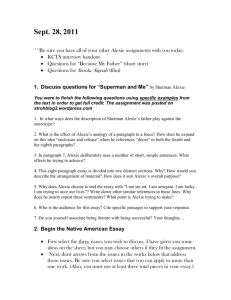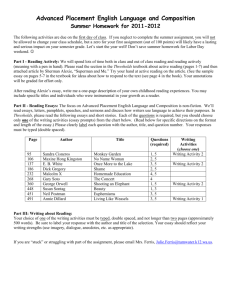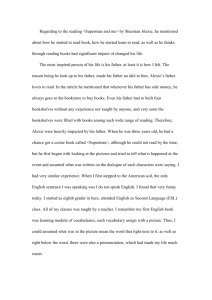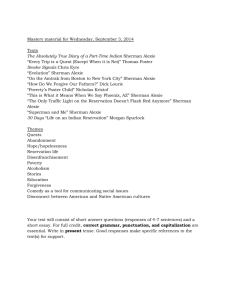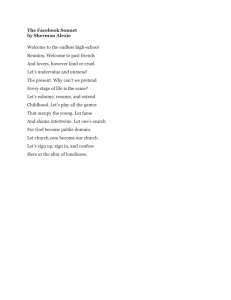student example CA final draft.doc
advertisement
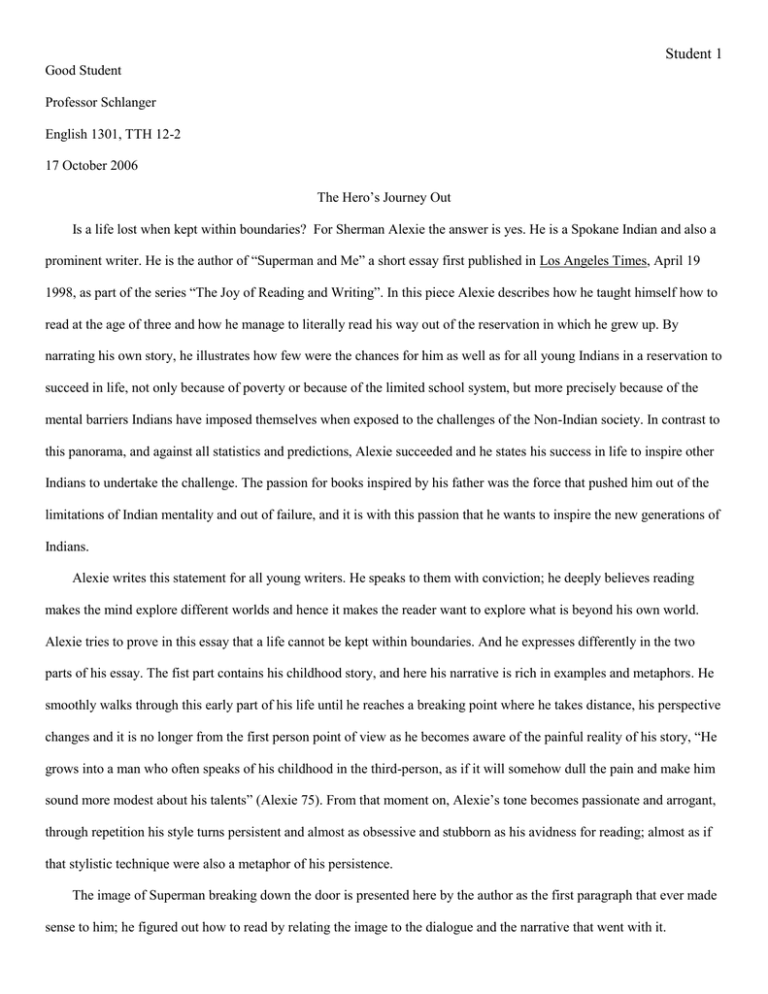
Student 1 Good Student Professor Schlanger English 1301, TTH 12-2 17 October 2006 The Hero’s Journey Out Is a life lost when kept within boundaries? For Sherman Alexie the answer is yes. He is a Spokane Indian and also a prominent writer. He is the author of “Superman and Me” a short essay first published in Los Angeles Times, April 19 1998, as part of the series “The Joy of Reading and Writing”. In this piece Alexie describes how he taught himself how to read at the age of three and how he manage to literally read his way out of the reservation in which he grew up. By narrating his own story, he illustrates how few were the chances for him as well as for all young Indians in a reservation to succeed in life, not only because of poverty or because of the limited school system, but more precisely because of the mental barriers Indians have imposed themselves when exposed to the challenges of the Non-Indian society. In contrast to this panorama, and against all statistics and predictions, Alexie succeeded and he states his success in life to inspire other Indians to undertake the challenge. The passion for books inspired by his father was the force that pushed him out of the limitations of Indian mentality and out of failure, and it is with this passion that he wants to inspire the new generations of Indians. Alexie writes this statement for all young writers. He speaks to them with conviction; he deeply believes reading makes the mind explore different worlds and hence it makes the reader want to explore what is beyond his own world. Alexie tries to prove in this essay that a life cannot be kept within boundaries. And he expresses differently in the two parts of his essay. The fist part contains his childhood story, and here his narrative is rich in examples and metaphors. He smoothly walks through this early part of his life until he reaches a breaking point where he takes distance, his perspective changes and it is no longer from the first person point of view as he becomes aware of the painful reality of his story, “He grows into a man who often speaks of his childhood in the third-person, as if it will somehow dull the pain and make him sound more modest about his talents” (Alexie 75). From that moment on, Alexie’s tone becomes passionate and arrogant, through repetition his style turns persistent and almost as obsessive and stubborn as his avidness for reading; almost as if that stylistic technique were also a metaphor of his persistence. The image of Superman breaking down the door is presented here by the author as the first paragraph that ever made sense to him; he figured out how to read by relating the image to the dialogue and the narrative that went with it. Student 2 However, this image is also what inspires and focuses his essay; it becomes the symbol of the heroic act of destroying barriers. So apart from being another one of the stylistic techniques he uses, the Superman metaphor lies underneath every theme Alexie proposes as the conducting idea. The existence of barriers that are not necessarily physical, the need for role models as a source for inspiration, and the passionate love for books that urged him to undertake a journey out of the reservation --physically and mentally; are all metaphoric components of this image. Superman breaks the door in front of him into pieces. Demolishing barriers takes powerful machinery or a super hero, in this case. But there are few physical barriers in today’s world, and there are too many “mental” barriers. Society, economy, culture, geographic location, ethnicity, language, gender, age group and education establish many of the levels in which individuals can situate themselves or be situated by others. A barrier is created whenever there is a significant difference between two human beings in at least one of those levels. Alexie frequently uses classification to explain that fact and to identify the many barriers that surrounded him as a child. The poverty in his community was certainly among the most important. “We were poor by most standards, but one of my parents usually managed to find some minimumwage job or another, which made us middle-class by reservation standards.” Poverty creates all sorts of limitations and constrains, it reduces the chances for a child to have access to a better education. So although an Indian reservation is not locked physically, for those who remain there, the locks start to appear inside their minds. Moreover, borders and barriers are everywhere and Alexie realizes it at a very early age. Without even knowing how to read he suddenly understood that a paragraph was in fact a boundary. “I didn't have the vocabulary to say "paragraph," but I realized that a paragraph was a fence that held words. The words inside a paragraph worked together for a common purpose. They had some specific reason for being inside the same fence. This knowledge delighted me. I began to think of everything in terms of paragraphs” (74). This discovery became the way he saw the world and a beautiful metaphor that makes the reader visualize the different ways in which boundaries exist in the world, and the many different ways in which books contain reality. Reading, as all the other themes in this essay, is approached by Alexie in two different ways. After he has situated the reader in the context of his family and the reservation, books first appear when he talks about his father. The ubiquitous presence of books in Alexie’s life started out because of him. “Our house was filled with books. They were stacked in crazy piles in the bathroom, bedrooms and living room.” (74). From his beloved father he inherited this being surrounded by books. He uses books as a protection against failure --as a boundary- but most of all they became his motif in life. And in the second part of this essay he explains vehemently through stylistic repetition. “…I read magazines. I read anything Student 3 that had words and paragraphs. I read with equal parts joy and desperation. I loved those books, but I also knew that love had only one purpose. I was trying to save my life.” (75). In other words, reading is the source where Alexie’s super powers come from (as in a Superman comic book) and the driving force of his quest out of the reservation. In most epic stories, the hero undertakes a journey, a quest. And in the course of this journey, the hero defeats the enemy and saves his own life and the lives of the enemy’s victims. There is one sentence that the author repeats twice and almost identically in this piece. The first time it appears in past tense and broke in two fragments, one at the beginning and the other one at the end of the seventh paragraph, “I was smart. I was arrogant. I was lucky… I was trying to save my life.” (75). The second time it appears as the closing sentence of the essay, only this time it is in present tense, “I am smart. I am arrogant. I am lucky. I am trying to save our lives.” (76). And now not only does he refer to his own life but those of the Indian children now growing up in a reservation. This is the way he shows the initial and the current stages of his journey, and the apparently tiny difference between “my life” and “Our lives” is what makes Alexie’s effort heroic and what identifies him with Superman. Alexie claims a source of inspiration –a hero- for today’s generation of young Indians and the generations to come; he tries to be that hero. He visits the reservation schools and teaches creative writing to young boys and girls, he insists: “Books,” I say to them. “Books,” I say. I throw my weight against their locked doors. The door holds.” (76). Alexie presents here a new image which is highly important because here he turns around the previous image of Superman braking down the door --around which he has built his essay. Reality crashes against Alexie’s desperate effort of saving young Indians from the mental and physical confinement of the reservation: “The door holds” he says. Superman has become Clark Kent all of a sudden. Is there no hope for young Indians? For Sherman Alexie the answer is no, there is indeed hope. And the way he answers that question is very subtle and clever, he does it when he changes the last sentence to the present tense. “I am trying to save our lives,” he finishes, so there is hope as long as he persists; as long as they all persist. 1) Pick out five (5) examples of “dumped quotes.” Correct them by adding signal phrases & incorporating them into the syntax. Make sure you include correct citation and punctuation. 2) Look closely at the transitions, especially the last sentence & first sentence of each paragraph. Find 2 instances where the connection, transition, can be strengthened. 3) Does the author go through the SEGA (Say it, Explain it, Give an example, Add commentary) process with each quotation or paraphrase? After each quotation, does the author add commentary? Student 4 Works Cited Alexie, Sherman. “The Joy of Reading and Writing: Superman and Me.” The Writers Presence. A Pool of Readings. Ed. McQuade, Donald. Atwan, Robert. Boston, MA: Bedford / St. Martin’s, 2006. 73-76.
